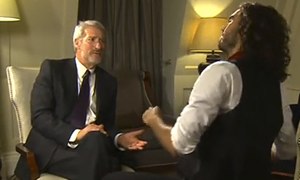John Kerry, the US secretary of state, sought to salvage forthcoming trade negotiations with the European Union amid growing signs that the Obama administration will act to stem some of the criticism of the National Security Agency's surveillance activities.
Speaking in Warsaw on Tuesday after talks with Poland's foreign minister, which included discussions about the NSA, Kerry said he understood why there were concerns in Europe, but insisted that a review of its programs would establish "the right balance".
The second round of negotiations over the ambitious Transatlantic Trade and Investment Partnership (TTIP) begin in Brussels next Monday, despite calls in Europe to suspend talks after a series of disclosures about US surveillance of European leaders.
The revelations, which included the disclosure that the NSA monitored the cell phone of the German chancellor, Angela Merkel, have caused a diplomatic rift that countries on both sides of the Atlantic are now trying to mend.
"The Transatlantic Trade Partnership is really separate from and different from any other issues people may have on their minds. This is about jobs. It's about the economy," Kerry said, adding: "Now, that should not be confused with whatever legitimate questions exist with respect to NSA or other activities."
Merkel and other European leaders have also said they do not want the talks over a wide-ranging trade deal to be jeopardised by the NSA controversy. But behind the scenes there are known reservations, not least given the advantage the US may gain through intrusive surveillance of the European trade delegation.
"It has become clear we're not doing business on a level playing field," a European official recently told the Guardian.
In Washington, there was further evidence that the Barack Obama's administration was increasingly prepared to curtail some of the activities of the NSA and other intelligence agencies.
Caitlin Hayden, a spokeswoman for the White House's national security council, said the administration had "already made some decisions" as part of its wide-ranging NSA review. Among the issues being examined in the review, which will conclude in December, are whether the NSA should surveil foreign leaders, and the possibility of additional "constraints" on the spy agency.
Administration lawyers are also reportedly considering the definition of "non-US persons", and the extent to which privacy guarantees supposedly afforded to US citizens, by virtue of constitutional rights, might be expanded to apply to foreigners based overseas.
More broadly, the administration is rethinking the National Intelligence Priorities Framework, a classified set of principles that, Hayden said, "could be modified to provide better policy guidance for our intelligence activities".
But senior officials appear determined to retain the program that has caused most controversy in the US since the Snowden disclosures - the bulk collection of Americans' phone records under a provision of the Patriot Act.
The NSA has been lobbying hard to maintain the program, and appears to have secured the support of the White House and the majority of members of the House and Senate intelligence committees.
The only concession officials are willing to countenance is a reduction in the period that the data is retained, from the current five years to three. In Congress, there are currently two surveillance reform bills that would scrap the bulk collection program, including one co-written by Congressman Jim Sensenbrenner, the author of the Patriot Act.
Administration lawyers appearing before a privacy oversight board on Monday repeated the same case made during a series of recent congressional hearings. Robert Litt, general counsel for the office of the director of national intelligence, said the intelligence community was open to a variety of possibly reforms providing they don't "eliminate" the utility of their surveillance programs.
He told the Privacy and Civil Liberties Oversight Board (PCLOB) that restrictions on the collection of records risked threatening the success of intelligence gathering. He was echoed by he FBI's acting general counsel Patrick Kelley.
"We'd be less agile, we'd be less informed, we'd be less focused," Kelley said. "We think we'd be a lot less effective at preventing the attacks the American people would want us to prevent."
After the public hearing, the board's chairman, David Medine, said: "I think we've learned a lot about some potential reforms that the government was amenable to."
During a recent visit to the White House, officials from the German chancellor's office are understood to have discussed "damage control" with their counterparts, in a co-ordinated bid to contain the fallout from a dispute that has enraged many Europeans.
That drive is being led by Kerry, America's top diplomat, and the most outspoken critic of the NSA within Obama administration. In a video broadcast to London last week, Kerry said the NSA had at times gone too far, with certain practices occurring "on autopilot" without the knowledge of senior officials in the Obama administration.
"We want to hear from our allies, we want to have this conversation," Kerry said in Warsaw. "President Obama welcomes this opportunity to work with our allies. And, ultimately, if we get it right, which we will, we will not only alleviate the concerns but we can actually strengthen our intelligence relationships."



















